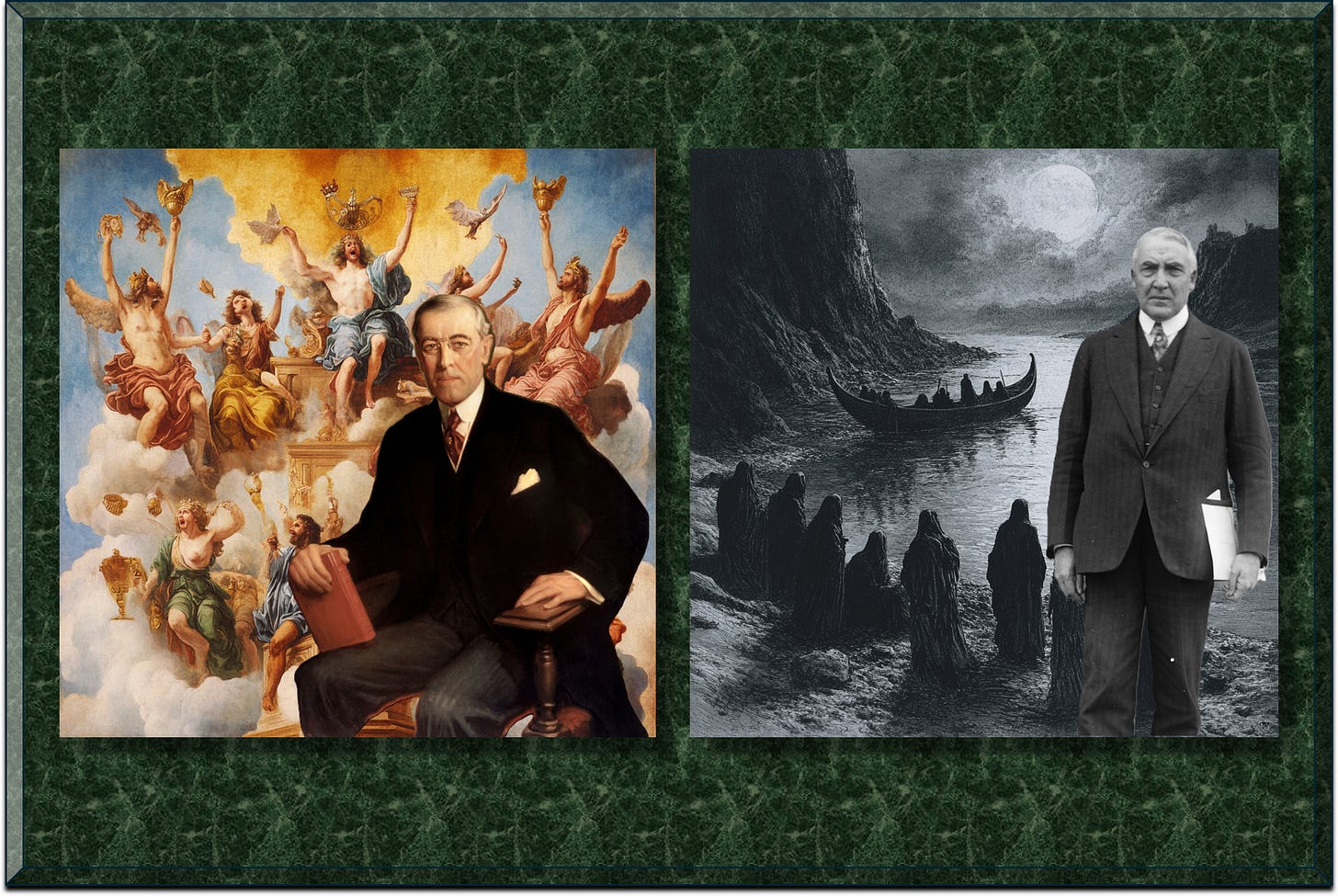
In February, 154 political scientists ranked all 45 U.S. presidents in terms of “greatness,” yielding a dog’s lunch of clickbait. The results are discredited most clearly by the fact that respondents (“experts”) placed Woodrow Wilson near the sunlit peak of Mount Olympus (#15) and Warren Harding in the gloomy depths of Hades (#40). The survey provides journalists with a Viagra/fentanyl cocktail, as seen in the New York Times headline and subtitle:
“Poll Ranks Biden as 14th-Best President, With Trump Last: President Biden may owe his place in the top third to his predecessor: Mr. Biden’s signature accomplishment, according to the historians, was evicting Donald J. Trump from the Oval Office.”
One needn’t admire Trump nor despise Biden to recognize that placing the hapless, doddering Biden 31 rungs higher than Trump represents boosterism, not scholarship. More on Trump and Biden later, but any ranking that doesn’t place Woodrow Wilson at or near the bottom is best suited for birdcages.
The survey, conducted by the Presidential Greatness Project, polled “current and recent members of the Presidents & Executive Politics Section of the American Political Science Association.” In the June 27th debate that ended his presidency, Biden cited these rankings and the embarrassing letter in which 16 Nobel economists shilled for his economic policies. Below are some questions that came to mind when perusing the survey results.
(NOTE: The survey ranks 45 presidents, not 46, because it only counts Grover Cleveland once, though he’s formally considered both 22nd and 24th presidents.)
WHY IS WILSON (#15) 25 RUNGS ABOVE HARDING? (#40)
My “Woodrow the Terrible, Warren the Good” (2023) offered some comparisons: Wilson was arrogant and misanthropic; Harding was modest and affable. Wilson catalyzed the 20th Century’s worst pathologies; Harding quietly initiated practical, unglamorous institutional innovations. Wilson was the most racist president in American history; Harding visited KKK territory to deliver the boldest call for racial equality ever issued by a U.S. president. Wilson opposed anti-lynching laws; Harding supported them. Wilson despised constitutional norms; Harding respected tradition. Wilson’s coterie (e.g., Attorney General A. Mitchell Palmer) ransacked civil liberties; Harding’s appointees (e.g., Calvin Coolidge, Charles Evans Hughes, William Howard Taft, Herbert Hoover, Andrew Mellon) mostly strove to stay out of Americans’ hair. Wilson demanded and obtained the oppressive Treaty of Versailles that fomented Nazism; Harding sought (with mixed success) to reduce international tensions. Wilson’s partisan pigheadedness sank his foreign policy initiatives; Harding’s congeniality fostered bipartisanship agreements. Wilson imprisoned Socialist Eugene V. Debs for publicly opposing World War I; Harding commuted his sentence and invited him to the White House. Wilson was narcissistic and attributed his election to divine intervention; Harding was humble and worried about his inadequacies. Wilson was secretly bedridden for over a year of his presidency, leaving his wife to run the country covertly; Harding had illnesses but remained functional till he died suddenly while traveling. Wilson departed as an unloved ghost; Harding died well-liked and respected.
Harding’s reputation sank posthumously over unethical behavior by several sidekicks (e.g., Albert Fall and Harry Daugherty), but even more so over the revelation that he had fathered an illegitimate child while president. John Kennedy (#10) and Bill Clinton (#12) must be relieved that priapism no longer counts against rankings.
HOW IS TRUMP MORE POLARIZING THAN LINCOLN?
Trump is certainly and intentionally a polarizing character—a provocateur. But how does one justify 170 votes for Trump as “Most Polarizing,” versus only 33 votes for Abraham Lincoln? Inexplicably, Lincoln also received 60 votes for “Least Polarizing” president. Consider the record:
In 1860, Lincoln’s name did not appear on the ballots of 10 states, he received less than 40% of the popular vote, conspirators sought to assassinate him before his inauguration, and his election led 11 states to secede from the Union, triggering the bloodiest war in U.S. history. In 2017, a professor wrote that Lincoln was reviled:
“as an ass, blackguard, buffoon, butcher, Caesar impersonator, clown, despot, dictator, federal vandal, fool, royal ape, tactless boor, treason’s masterpiece, tyrant and usurper … a man of ‘weak, wishy-washy, namby-pamby efforts’ … [a president who made America] ‘the laughing stock of the whole world’ … a small-town rube lawyer who in a big city ‘could pass for no more than a facetious pettifogger.’ … [A Louisiana paper said the U.S was] “so shamed and debased before the world by the ridiculous, vulgar and pusillanimous antics of the coarse and cowardly demagogue whom a corrupt and crazy faction [Yankee Republicans] has elevated to the chair once filled by Washington, Jefferson and Jackson” [and that] Lincoln’s “silly speeches, his ill-timed jocularity, and his pusillanimous evasion of responsibility, and vulgar pettifoggery, have no parallel in history save for the crazy capers of Caligula, or in the effeminate buffoonery of Henry of Valois.”
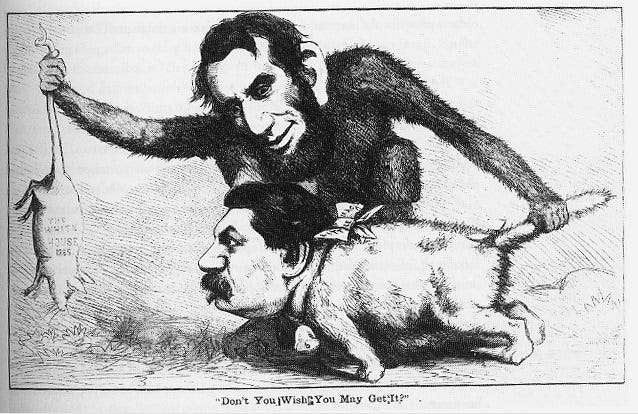
In an 1864 novel popular among racist Northern antiwar Democrats (“Copperheads”), Lincoln was portrayed as “Abraham Africanus I”—a despot who strikes a bargain with the Devil to become king. Among other things, the book fantasizes about Lincoln’s assassination (a year before his actual assassination). The former head of Lincoln’s Army ran against him in 1864 in a bitter race. Lincoln was shot to death by a member of America’s most prominent theatrical family.
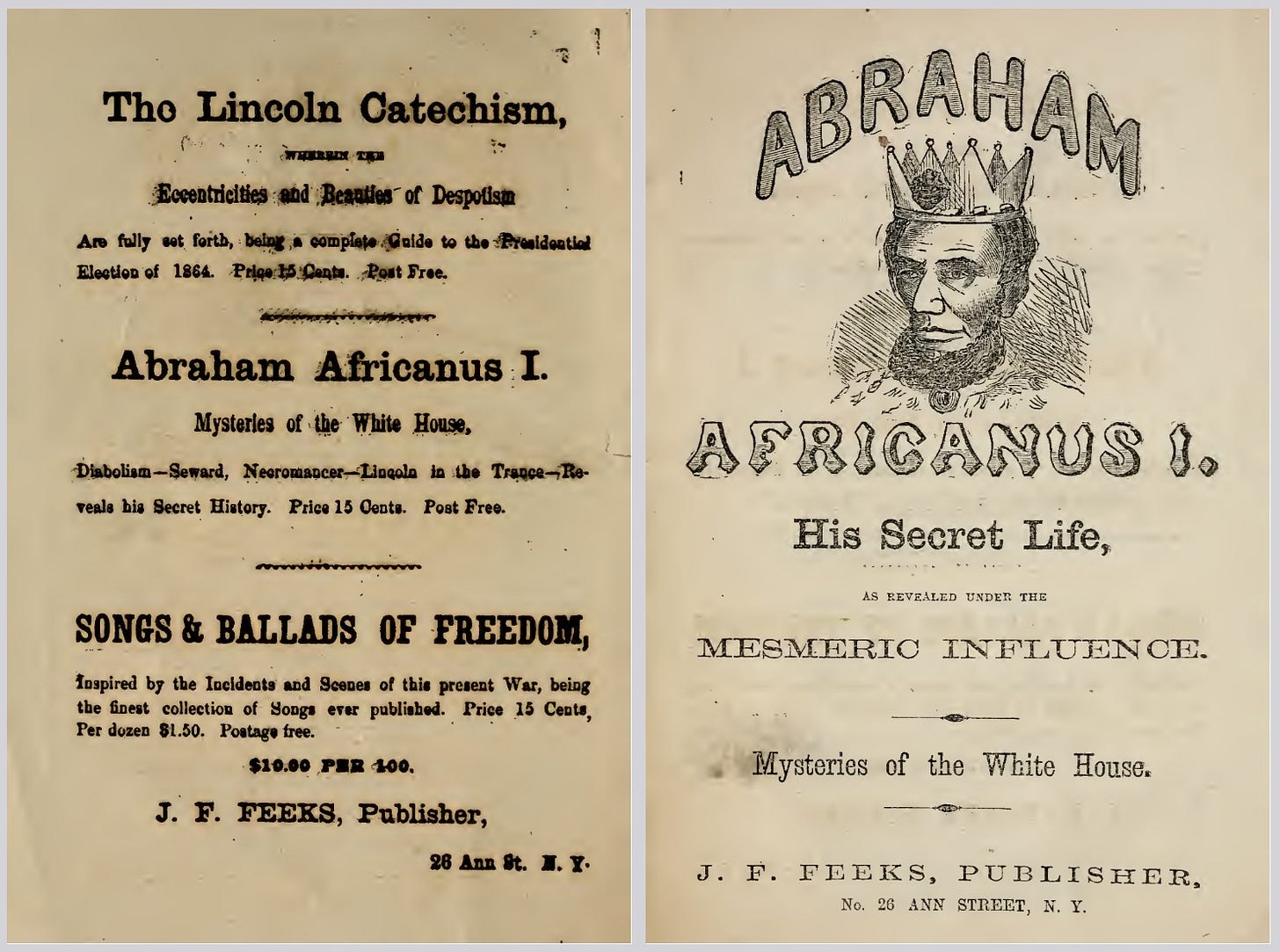
HOW DID 154 RESPONDENTS AWARD TRUMP 170 VOTES?
In the aforementioned result, Trump received 170 votes as “most polarizing president” in U.S. history, but the survey document says only 154 respondents submitted “usable results.” Perhaps the authors should explain how there were more votes than participants—lest conspiracy theorists start asking about photo IDs, ballot harvesting, undocumented voters, and dicey voting machines.
HOW IS IT THAT TRUMP IS POLARIZING, BUT BIDEN IS NOT?
Trump received 170 “most polarizing” votes versus Jackson’s 74, Obama’s 69, Reagan’s 66, Nixon’s 55, George W. Bush’s 55, Andrew Johnson’s 39, Biden’s 36, Lincoln’s 33, FDR’s 31, LBJ’s 24, Clinton’s 24, and Wilson’s 21. One needs a large warehouse full of recency bias to assume that polarization in our era exceeds that of some of these prior periods. Jefferson and Adams are nowhere on the list, yet the 1800 election was among the bitterest ever, with both presidents subjected to some of the ugliest journalistic bile in American history.
It’s particularly telling that respondents gave Trump nearly five times as many “most polarizing” votes as Biden. Trump is undeniably, deliberately, and virulently polarizing. But Biden has been a key agent in many or most of the most divisive fault lines of the past half-century: smearing Robert Bork and Clarence Thomas, conjuring up the “Biden Rule,” vilifying the current Supreme Court during the State of the Union Address, accusing Mitt Romney of wishing to put African Americans back in chains, filibustering George W. Bush’s black and Hispanic Supreme Court nominees, calling Reagan’s “tear down this wall” speech “dangerous rhetoric,” referring to Reagan as “smooth, but pure demagogue,” issuing incendiary attacks on the 1991 Gulf War, endlessly misusing the long-debunked “very fine people on both sides” quote, allowing mobs to violate federal and state laws by surrounding Supreme Court justices’ homes for weeks or months, engaging in middle-school theatrics during his 2012 debate with Paul Ryan, assailing the decency of right-to-lifers after Biden himself voted for an antiabortion constitutional amendment to overturn Roe v. Wade, swearing to circumvent the Supreme Court on student loans, telling a black audience that “you ain’t black” if you can’t decide between Trump and Biden, and assailing ordinary Americans with epithets like “lying dog-faced pony soldier” and “low IQ.” Add to all of this Biden’s voluminous history of fabulism (e.g., arrested while trying to see Nelson Mandela) and plagiarism (e.g., borrowing Neil Kinnock’s life).
In 1982, Biden threatened to cut off aid to Israel during its War in Lebanon—eliciting a legendary face-to-face response from Menachem Begin:
“Don’t threaten us with cutting off aid to give up our principles. I’m not a Jew with trembling knees. I am a proud Jew with 3,700 years of civilized history. Nobody came to our aid when we were dying in the gas chambers and ovens. Nobody came to our aid when we were striving to create our country. We paid for it. We fought for it. We died for it. We will stand by our principles. We will defend them. And, when necessary, we will die for them again, with or without your aid.”
HOW WAS GARFIELD A GREATER PRESIDENT THAN ARTHUR?
James Garfield (#30) was one of the most impressive individuals ever elected president, while his vice president, Chester Arthur (#33) was a shady hedonist at the time the pair was elected. However, Garfield’s accomplishments as president are practically nil, as he was felled by an assassin only four months into his term. A grief-stricken, guilt-ridden Arthur stunningly reinvented himself overnight as an upright, honorable workhorse who sent his sleazy former colleagues packing, replaced the Spoils System with a professional Civil Service, worked to modernize the U.S. Navy, and sought to improve life for Native Americans and African Americans. Given this history, it’s difficult to fathom how the 2024 survey places Garfield above Arthur in terms of greatness. (The Garfield/Arthur story is told magnificently by Candice Millard in Destiny of the Republic: A Tale of Madness, Medicine, and the Murder of a President.)
WHICH DRUGS ARE POTENT ENOUGH TO PERSUADE ANYONE THAT CARTER WAS GREATER THAN POLK—OR UNDER-RATED?
James K. Polk (#25) was arguably the single most successful president in U.S. history and walked away from the office after one term; Jimmy Carter (#22) was a petulant blunderer whom the voters hurled from office like an ox on a trebuchet.
Under Polk, the U.S. annexed the Republic of Texas, avoided war with Britain by negotiating American sovereignty over half of the Oregon Country, and defeated a gigantic Mexican Army to conquer all the territories between Texas and the Pacific. He reduced tariffs, re-established an independent U.S. Treasury, halted federal funding of public works that he saw as unconstitutional, and helped spark the California Gold Rush. He defied various political big-wigs to construct the Cabinet he wanted—not the Cabinet they wanted. He was the first president to put muscle behind the Monroe Doctrine. Polk ran on a highly ambitious platform, barely won the election, and then, by dint of political skills, accomplished virtually everything he set out to do. A workaholic, he said:
“No President who performs his duty faithfully and conscientiously can have any leisure. I prefer to supervise the whole operations of the government myself rather than intrust the public business to subordinates, and this makes my duties very great.”
His long hours of work likely destroyed his health, and he died three months after leaving the White House, at age 53.
Jimmy Carter’s presidency had a few successes (e.g., airline deregulation, the Camp David Accords) but is mostly remembered as four years of malaise, misery, mush, mullahs and meddling. Google “Carter” along with “Malaise Speech,” “Misery Index,” “Mush from the Wimp,” if you’re unfamiliar with the first three. Carter helped the mullahs’ rise to power in Iran and then spent nearly a third of his presidency flailing impotently as those mullahs held 53 American hostages. Carter had difficulty enacting his economic programs because he couldn’t get along with Democrats in Congress. Carter originated (or popularized) the “apartheid” smear against Israel.
But survey respondents rated Carter as greater than Polk. And, having insufficiently humiliated themselves, 64 of those experts also voted Jimmy Carter one of the “most under-rated” presidents in history—giving Carter more votes in that area than any other president.
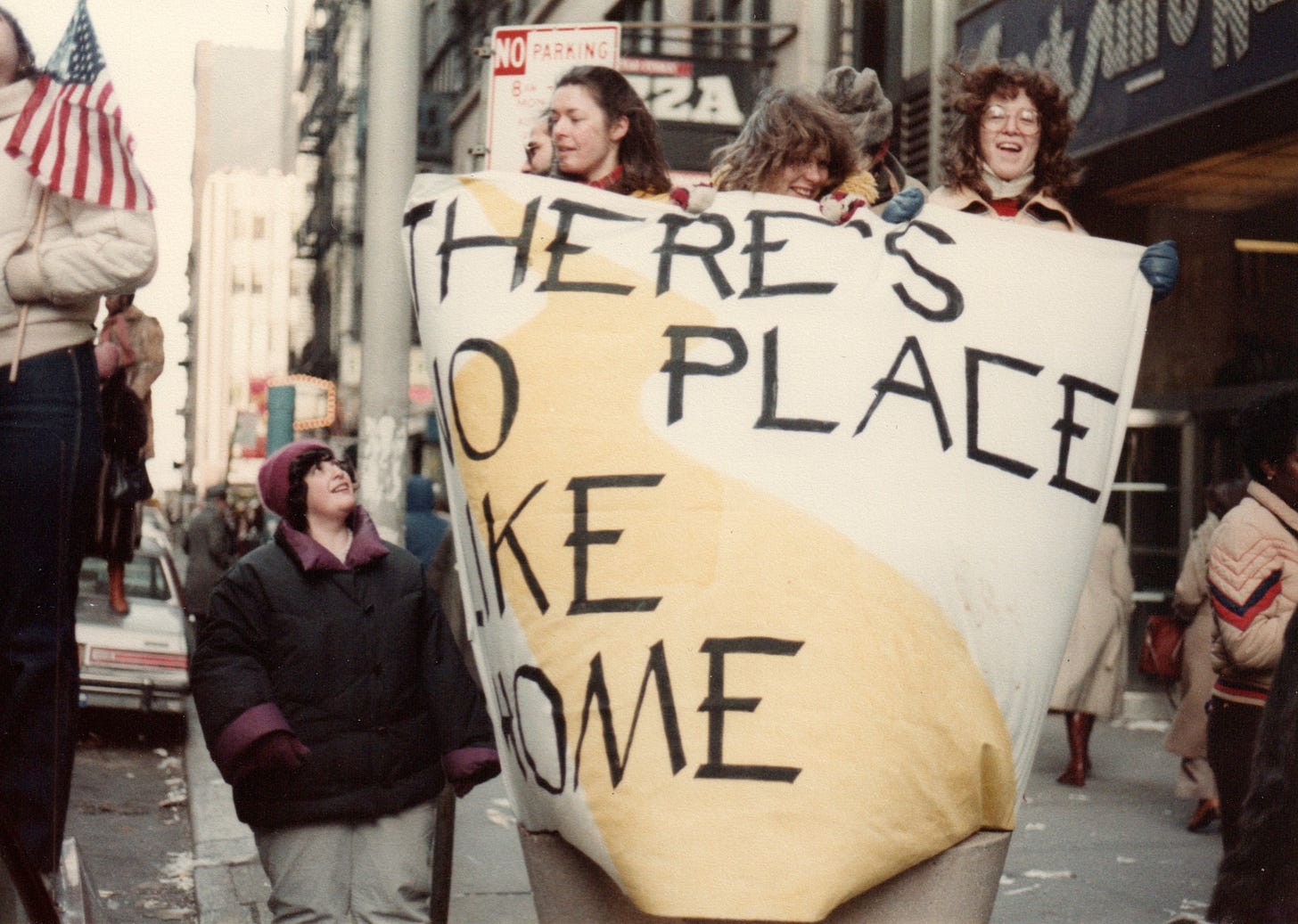
WHAT SORT OF REPUBLICAN OR CONSERVATIVE THINKS CLINTON, WILSON, CARTER, AND OBAMA WERE GREATER PRESIDENTS THAN COOLIDGE?
In the era bookended by Teddy Roosevelt and Joe Biden (1901-2024), precisely two presidents have made the case for limited government and lived by those principles as president: Calvin Coolidge and Ronald Reagan. Amity Shlaes made the case for the 30th president’s greatness in her magisterial biography, Coolidge. In a Forbes article, Shlaes offered a lyrical metaphor:
“A windsurfer looks as though he's doing nothing at all, just riding the wind; however, the sport takes great strength. Even in a gust of wind the windsurfer must minimize his movement, holding still or pulling in. President Coolidge often looked as though he were doing nothing, and his peers, as well as later observers, mocked him for it. But in fact the Coolidge style of government, which included much refraining, took great strength and yielded superior results. Nowhere did the Great Windsurfer demonstrate such strength more than on the waters of economics.”
Most academicians are Democrats/Progressives/Liberals, so it’s predictable that most of those responding to the Presidential Greatness Survey would not be deeply enamored of Coolidge. But what about respondents who self-identify as Republicans and/or Conservative? In the table below, the 154 respondents included 15 self-described Republicans and 20 conservatives.
One might have expected Coolidge to vault upwards in the votes of those Republican/Conservative respondents, but the differences were modest. The Republicans still ranked Clinton, Wilson, and Obama higher than Coolidge, and Carter only slightly lower. Conservative respondents rated Clinton, Obama, Wilson, and Carter higher than Coolidge. As one who finds Shales’s thesis compelling, I find this to be a curious result.
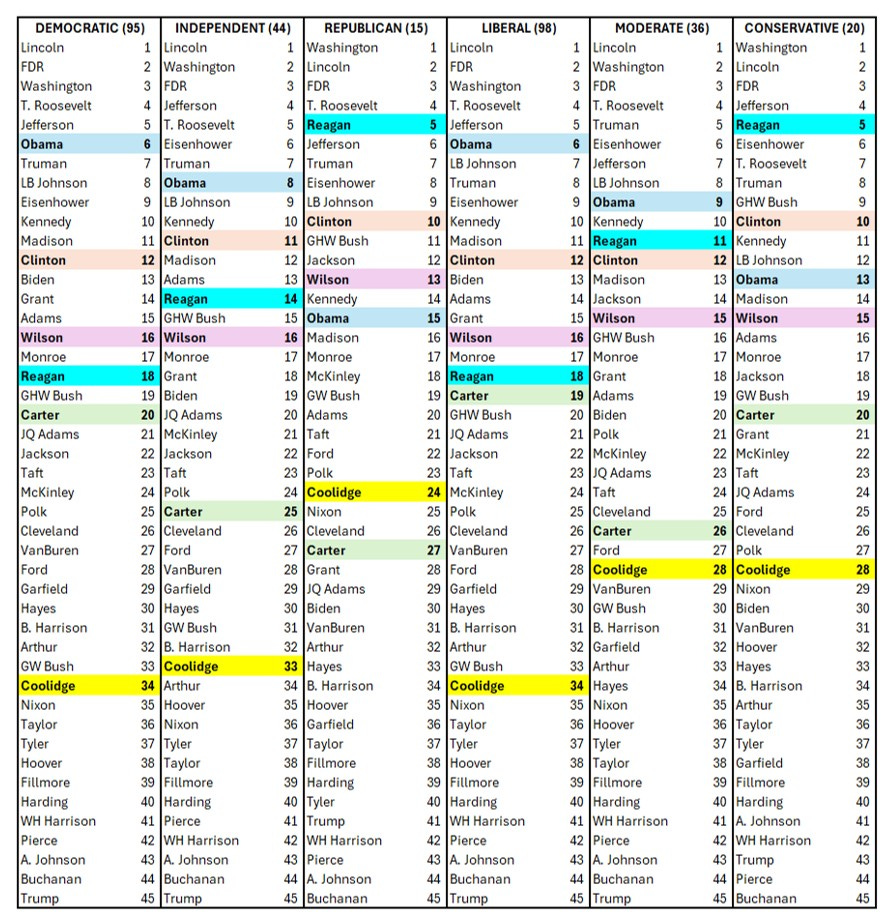
CONCLUSION
Expert rankings often tell you much about the experts filling out the surveys and relatively little about the subjects they are ranking. Years back, U.S. News & World Report issued an annual list of “America’s Most Livable Cities.” For some reason, Pittsburgh was always at or near the top, and each year, newspapers reported that result as breathlessly as they would a cure for Alzheimer’s or contact with extraterrestrial life. Pittsburgh is pleasant, but is it the ne plus ultra of American urbanity? On this topic, my 1990 article, “Gush, Gush, Sweet Charlotte,” said:
“Rankings invariably reflect someone’s opinion of a good community—say communities with 5 inches of snow annually, a ballet company, and moderate crime are better than communities with 10 inches of snow, no ballet company, and low crime. If you like snow, hate ballet, and are petrified of crime, then this ranking isn’t of much use to you.”
These 2024 presidential rankings are back-of-the-envelope musings by 154 politically biased academics. Very likely, most (including self-styled Republicans and conservatives) instinctively favor presidents who are progressive, activist, splashy, and complex over those who are conservative, passivist, sedate, and uncomplicated. Rankings for more recent presidents are hormonally hyperprone to exaggeration. Make of them what you may.
LAGNIAPPE
THE FIRST CAMPAIGN FILM
This video is believed to contain history’s first political campaign film, “The Old Way and the New.” Produced by the Democratic National Committee in 1912 on behalf of Woodrow Wilson, the film’s populist themes are perfectly recognizable 112 years later—tariffs, minimum wage, special interests, banks, partisan spitballs.




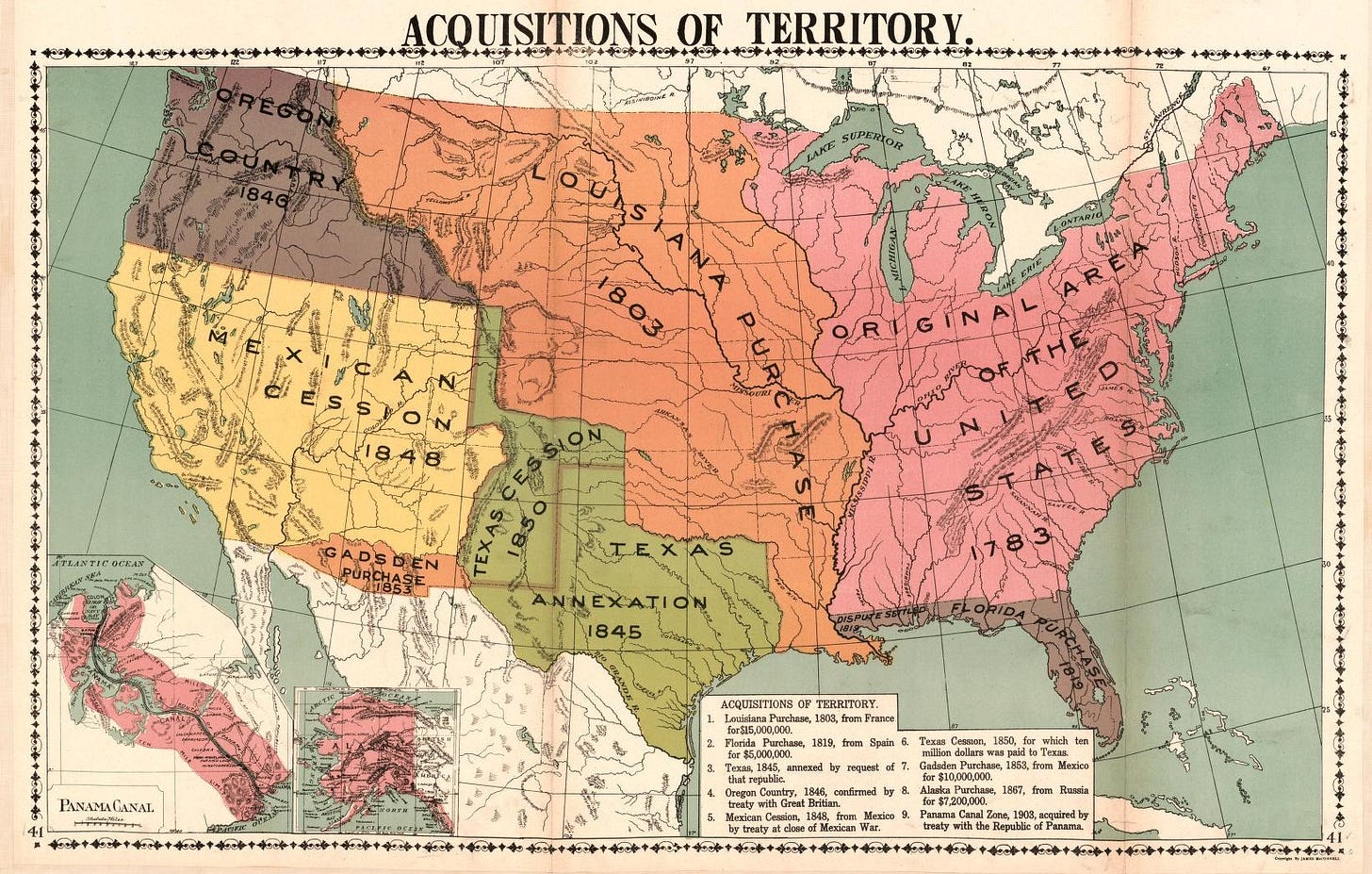
Very entertaining and informative piece, Professor Graboyes. Thank you for the very interesting comparisons of the various Presidents.
As someone who spent 6 years in grad schools studying Economics, I do not feel unqualified to comment on the social sciences. It saddens me to have to include History in the same intellectual dung heap as Psychology and Sociology, but I do.
History, especially as it is practiced now, is no more a science than the various Studies programs. These “best of” ranking endeavors are equally unserious, like Apple’s recent albums ranking.
Experts like visible activity rather than effective, and in this case, constitutional and quiet competence. To paraphrase the great Thomas Sowell when someone asked him if he would run for elective office, his response was to the effect, how would anyone vote for him when his campaign slogan would be “ vote for me, I’ll leave you alone”. I tried a version of that 3 times in my township and lost. But then I live in a town with a 35 year history of total Democrat elective office holders. I suppose my fellow citizens like the idea of high taxes and intrusive government. When asked they deny it but still vote for it. The “ experts” could be my neighbours. Just a comment on “experts”. One of my graduate students commented after a visiting lecturer, “ an expert is an ex or former or has been and a spert is a drip under pressure”. Ever since that time ever I have been introduced as an expert I demure and say I’m just a person knowledgeable in my field. And so the people voting on the “ best” presidents are “experts”.